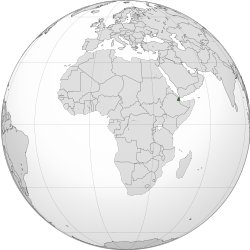Djbouti
|
Republic of Djibouti |
|||||
|---|---|---|---|---|---|
|
|||||
 |
|||||
| Capital and largest city |
Djibouti City 11°36′N 43°10′E / 11.600°N 43.167°E |
||||
| Official languages | |||||
| Recognised national languages | |||||
| Religion | Islam | ||||
| Demonym | Djiboutian | ||||
| Government | Dominant-party semi-presidential republic | ||||
| Ismaïl Omar Guelleh | |||||
| Abdoulkader Kamil Mohamed | |||||
| Legislature | National Assembly | ||||
| Independence | |||||
|
• from France
|
27 June 1977 | ||||
| Area | |||||
|
• Total
|
23,200 km2 (9,000 sq mi) (150th) | ||||
|
• Water (%)
|
0.09 (20 km² / 7.7 sq mi) | ||||
| Population | |||||
|
• 2016 estimate
|
846,687 | ||||
|
• Density
|
37.2/km2 (96.3/sq mi) (168th) | ||||
| GDP (PPP) | 2017 estimate | ||||
|
• Total
|
$3.658 billion | ||||
|
• Per capita
|
$3,584 | ||||
| GDP (nominal) | 2017 estimate | ||||
|
• Total
|
$2.088 billion | ||||
|
• Per capita
|
$2,045 | ||||
| Gini (2009) | 40.0 medium |
||||
| HDI (2015) |
low · 172nd |
||||
| Currency | Djiboutian franc (DJF) | ||||
| Time zone | EAT (UTC+3) | ||||
| Drives on the | right | ||||
| Calling code | +253 | ||||
| ISO 3166 code | DJ | ||||
| Internet TLD | .dj | ||||
Coordinates: 11°30′N 43°00′E / 11.500°N 43.000°E
Djibouti (/dʒɪˈbuːti/ ji-BOO-tee; Arabic: جيبوتي Jībūtī, French: Djibouti, Somali: Jabuuti, Afar: Gabuuti), officially the Republic of Djibouti, is a country located in the Horn of Africa. It is bordered by Eritrea in the north, Ethiopia in the west and south, and Somalia in the southeast. The remainder of the border is formed by the Red Sea and the Gulf of Aden at the east. Djibouti occupies a total area of just 23,200 km2 (8,958 sq mi).
In antiquity, the territory was part of the Land of Punt and then the Sabean and axumite rule. Nearby Zeila (now in Somalia) was the seat of the medieval Adal and Ifat Sultanates. In the late 19th century, the colony of French Somaliland was established following treaties signed by the ruling Somali and Afar sultans with the French and its railroad to Dire Dawa (and later Addis Ababa) allowed it to quickly supersede Zeila as the port for southern Ethiopia and the Ogaden. It was subsequently renamed to the French Territory of the Afars and the Issas in 1967. A decade later, the Djiboutian people voted for independence. This officially marked the establishment of the Republic of Djibouti, named after its capital city. Djibouti joined the United Nations the same year, on 20 September 1977. In the early 1990s, tensions over government representation led to armed conflict, which ended in a power sharing agreement in 2000 between the ruling party and the opposition.
...
Wikipedia


